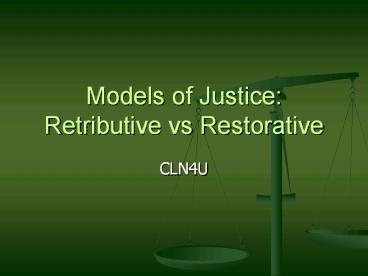Models of Justice: Retributive vs Restorative - PowerPoint PPT Presentation
1 / 6
Title:
Models of Justice: Retributive vs Restorative
Description:
Models of Justice: Retributive vs Restorative CLN4U Retributive Justice Broad focus: crimes are against the state/society Emphasis on punishing those who have ... – PowerPoint PPT presentation
Number of Views:153
Avg rating:3.0/5.0
Title: Models of Justice: Retributive vs Restorative
1
Models of JusticeRetributive vs Restorative
- CLN4U
2
Retributive Justice
- Broad focus crimes are against the state/society
- Emphasis on punishing those who have committed
crimes - The punishment should fit the crime
3
Kants Debt Metaphor
- Citizens in a society enjoy the benefits of a
rule of law - According to the principle of fair play, the
loyal citizen must do their part in this system
of reciprocal restraint - An individual who seeks the benefits of living
under the rule of law without being willing to
make the necessary sacrifices of self-restraint
is a free rider - Theyve helped themselves to unfair advantages,
and the state needs to prevent this to preserve
the rule of law
4
Kants Debt Metaphor
- In cases of wrongdoing, someone who merits
certain benefits has lost them, while someone who
does not deserve those benefits has gained them - Punishment "removes the undeserved benefit by
imposing a penalty that in some sense balances
the harm inflicted by the offense. - It is suffered as a debt that the wrongdoer owes
their fellow citizens
5
Restorative Justice
- Rights-based approach focusing on peaceful
resolution of wrongs - Not so much based on punishing the offender, but
on having the offender set things right by
recognizing, accepting, and taking real
responsibility for their actions - Similar to Aboriginal concept of Healing
Justice healing the wrong in a cooperative manner
6
Comparison
Retributive Justice Restorative Justice
Crime is an act against the state, a violation of a law (abstract) Crime is an act against another person and the community
Crime is an individual act with individual responsibility Crime has both individual and social dimensions of responsibility
Punishment is effective (threat of punishment deters crime punishment changes behaviour) Punishment alone is not effective in changing behaviour and is disruptive to community harmony and good relationships
Victims are peripheral to the process Victims are central to the process of resolving a crime
Focus on establishing blame or guilt, on the past (did he/she do it?) Focus on the problem solving, on liabilities/obligations, on the future (what should be done?)
Emphasis on adversarial relationship Emphasis on dialogue and negotiation































